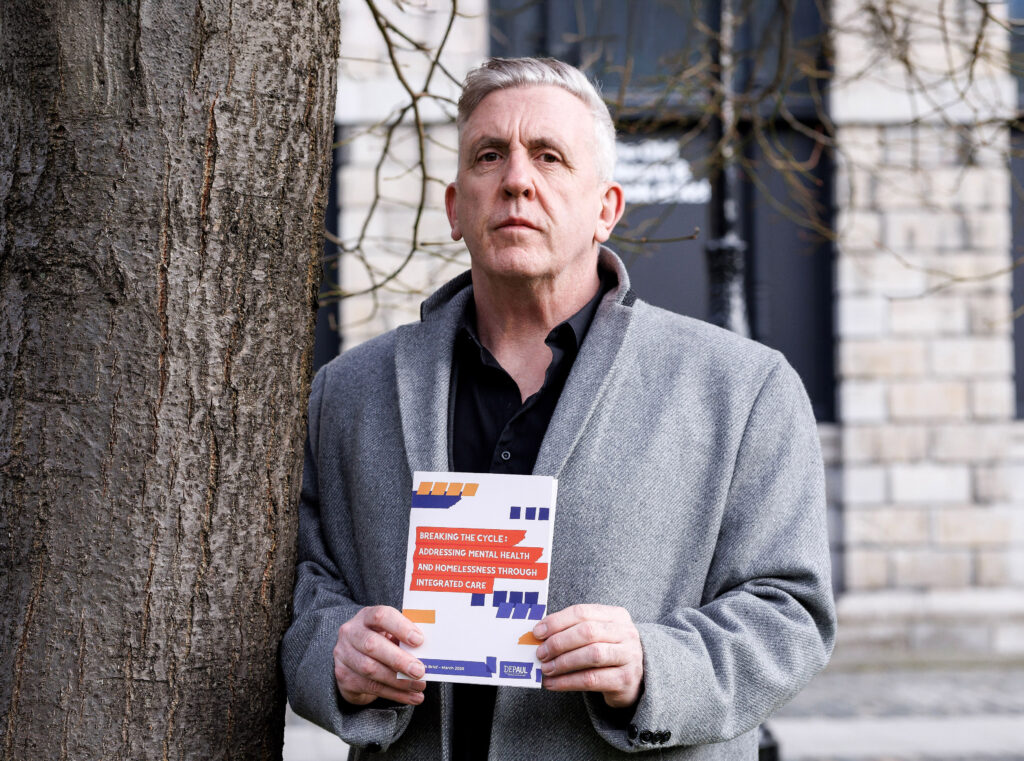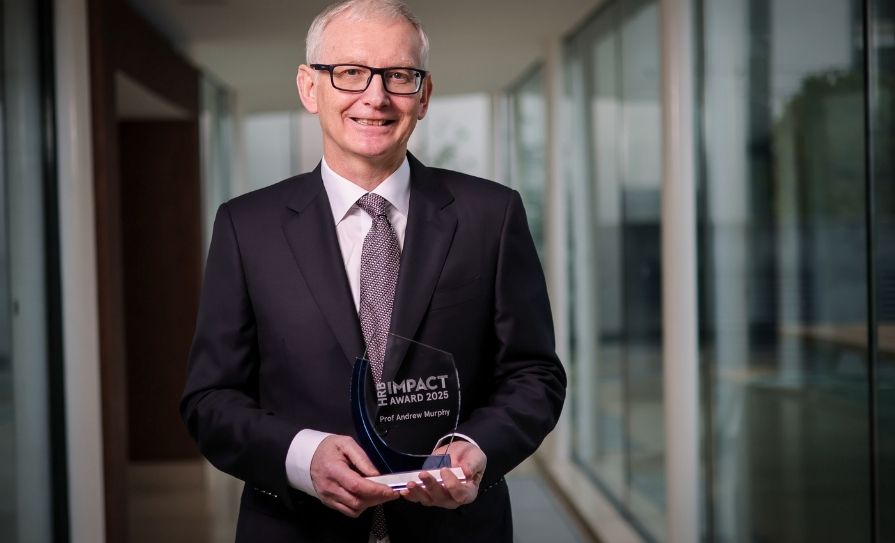The rise in people experiencing homelessness and the wider housing crisis have created significant healthcare challenges, particularly in mental health. David Lynch reports
Unwanted records keep getting set.
Figures from the Department of Housing, Local Government, and Heritage show that in February, 15,378 people were homeless and living in emergency accommodation – another record high.
According to the Simon Communities of Ireland, there has been an 11.1 per cent increase in emergency accommodation since February 2024, with 1,537 more people seeking shelter.
“While the numbers rise month after month, we continue to see families, children, and young adults struggling to find stable and safe housing,” said Ms Ber Grogan, Simon’s Executive Director. “This is a grim situation and the time for significant change is long overdue.”
Doctors and other observers report that rising emergency accommodation figures, combined with the wider housing crisis, are impacting healthcare provision, particularly mental health.
Profile
The HSE engages with people who are experiencing homelessness through a wide range of services.
The profile of this cohort “is shifting”, with an increasing number of migrants entering homeless services, according to a HSE spokesperson.
Homelessness is not a “one-size-fits-all issue”. Individuals have diverse health and social care needs that require tailored interventions, the spokesperson said.
“Emerging drug trends are also being closely monitored, as they impact health and place additional pressure on
support services.”
The spokesperson noted that homelessness is “strongly linked” to higher rates of mental health issues, substance use, and physical health problems. “The HSE, in partnership with local authorities and voluntary organisations, provides in-reach and outreach healthcare supports to help individuals maintain housing and access necessary services.”
The spokesperson added that a “key challenge” has been the growing number of people entering private emergency accommodation (PEA), which has traditionally provided less structured support compared to supported temporary accommodation.
“While PEAs were originally intended for individuals with lower support needs, increasing demand and limited capacity mean that more people with complex health and social care needs are now being placed in these settings.”
To address this, the HSE has established an integrated care and case management team in the Dublin region, with plans to expand this model nationally.
“This team provides essential health and case management support to individuals in PEAs, ensuring they receive the assistance needed to stabilise their situation and access appropriate services.”
Many of my patients have not had their own bed to sleep in for years; they must sleep on the floor or in a chair
Impact
The enduring housing crisis continues to impact primary care.
Deep End Ireland is a group of general practitioners working in the most disadvantaged communities in Ireland. Housing challenges have increased pressure on these practices, Dr Bríd Shanahan, Clinical Lead with Deep End Ireland and GP at Summerhill Family Practice, Dublin, told the Medical Independent (MI).
Patients experiencing homelessness have significantly higher physical and mental health needs compared to housed patients, “yet there is no additional resourcing to support this increased demand.”
This places further strain on already overstretched general practice services, making it increasingly difficult to provide adequate care.
Dr Shanahan noted that housing is an important social determinant of health. “Without stable accommodation, patients’ health is suffering. Homelessness is also an adverse childhood experience, with lasting consequences for child development.”
Reflecting on experiences from her own practice, Dr Shanahan said she sees children attending disability services, “where clinicians struggle to determine whether developmental delays are due to autism spectrum disorder or the effects of unstable housing and social deprivation.”
“Many children living in homelessness may not yet display consequences of this trauma, but this adverse childhood experience increases their risk of chronic health conditions, mental health issues, and substance misuse in adulthood. This is a consequence of the current housing crisis that we will be managing for decades to come.”
Delving into discharge
The homeless hospital discharge programme (HDDP) began in 2018. The HDDP is an interagency service for the delivery of healthcare to people experiencing homelessness in Dublin.
The HSE told the Medical Independent that a recent independent evaluation of the HDDP demonstrated it had successfully implemented its key element to improve service delivery for patients experiencing homelessness. “It is recognised as an innovative approach to complex healthcare challenges,” according to the HSE.
The current rise in homelessness is likely impacting the programme, the HSE spokesperson said, “but the extent is difficult to determine.” Health equity indicators, such as housing status, are not routinely collected in hospital data systems, making it “challenging” to track the exact number of homeless patients.
“However, given the overall increase in homelessness, it is expected that hospitals are now treating more patients experiencing homelessness
than before.”
The HSE said it is “committed” to addressing this issue by supporting the development of social inclusion indicators within hospital data systems.
Hidden
Dr Shanahan said that the challenges go beyond those officially classified as homeless.
“Hidden homelessness” is a major issue, she explained. “I regularly see extended families of over 10 people living in two-bedroom houses. Many of my patients have not had their own bed to sleep in for years; they must sleep on the floor or in a chair.”
This overcrowding has severe consequences, including chronic back pain and sleep deprivation, “not to mention the profound impact it has on mental health.”
“Yet, without improvements in their living conditions, their mental health cannot improve, creating a vicious cycle.”
She noted that GPs spend an increasing amount of time advocating for housing on behalf of patients – work that, while essential, takes time away from clinical care. “The current housing crisis is not only worsening health inequity, but also placing a massive and unsustainable burden on Deep End general practice.”
Mental health is “a significant issue”, said Dr Enda Barron, GP and Clinical Lead of the Safetynet Primary Care team in Dublin. Safetynet employs GPs, nurses, and support workers to provide services to people who are homeless and vulnerable groups. Dr Barron told MI that issues highlighted in the recent Depaul and Mental Health Reform (MHR) report (see panel p6) are also reflected on the ground.
“We do a lot of targeted interventions with people living in homelessness around mental health and I think the mental health teams that are in existence are excellent – but they are completely
under-resourced.”
More clinical nurse specialists, in particular, are needed to allow more outreach.
“Because, quite often our patients won’t turn up to appointments, so it’s really around bringing the care to where the people are at. That is kind of the ethos [of Safetynet]… we provide our care… where people are at. So that is around providing services in hostels and trying to negate the barriers to access of care.”
Dr Barron said the recent rise in homeless figures has not led yet to a “significant increase in demand” for Safetynet services through presentations at its open access clinics or outreach clinics. However, he added that this was specific to Dublin’s experience of the problem.
“I can’t comment on the likes of Cork, Limerick or Galway because they have less services for that target group.”
He agreed that mental health is the “most challenging” issue, adding that a lack of inpatient hospital beds created particular problems.
“Take someone whose mental health deteriorates significantly – say, for example, if they have schizophrenia and they become psychotic in the community. Trying to access beds is very, very difficult and that’s because there are no beds.” Echoing points made elsewhere by the IMO and IHCA regarding hospital bed capacity, Dr Barron noted that across the system inpatient beds per capita in Ireland are lower than many European countries.
Rise in ‘demand and referrals’ to inclusion health teams
The HSE’s response to the acute needs of homeless and other marginalised groups is also supported by the development of inclusion health services in a number of hospitals nationally.
According to the Executive, inclusion health teams (IHT) are “integral” to patient flow and operating the homeless discharge protocol, developing strong relationships with local authorities, and ensuring additional ‘wrap-around’ support services with the HSE and other voluntary service providers.
“The IHTs are important in developing comprehensive discharge plans, ensuring communication of health service needs to community services and following up on client situations,” the HSE spokesperson said.
The HSE stated that IHTs are in place in adult, paediatric, and maternity hospitals in a number of major urban areas.
“However, many of these teams are not yet operating fully due to vacancies within the teams.”
IHTs continue to see a “rise in demand and referrals to its service”. The teams respond to a broad range of patients from marginalised or disadvantaged groups, including those experiencing homelessness.
“Increased demand for these services can arise from increasing needs, but also a recognition of the impact and improvements such teams can make for patients referred to them.”
Dr Enda Barron, Safetynet, told the Medical Independent that the inclusion health services provided in St James’s Hospital and the Mater Misericordiae University Hospital, Dublin, “play a significant role in supporting our target group” and represent a considerable increase in the scale of services provided from years past.
Some of this work is around discharge planning and “making sure people have access to medication, more appropriate accommodation, things like that”, Dr Barron said.
“There is definitely [now] more joined-up thinking towards providing services… we’ve a greater understanding of the needs of those…[experiencing] homelessness.”
Urgent
The mental health cost of homelessness was recently highlighted in a new report from Depaul and MHR. The report revealed the growing intersection of homelessness and mental health issues and the need for “urgent” systemic reform.
Breaking the Cycle: Addressing mental health and homelessness through integrated care found that at least one in two residents in Depaul services are struggling with thoughts of depression, anxiety, and suicidal thoughts.
Within Depaul’s services, 36.9 per cent of residents (2018-2023) reported enduring mental health difficulties requiring intervention, nearly twice the national rate. This is, according to Depaul, “more than likely massively underestimated” as the Government’s homelessness data excludes many people living in precarious situations, such as those couch-surfing or living in direct provision.
The report was launched last month in Trinity College Dublin. Speaking at the launch Mr David Carroll, CEO of Depaul, told MI that a “one-stop-shop” or a “single point of entry” in the health service is required for people who are currently homeless, “rather than having to go from pillar to post.”
“There is a need for a recognised entry point, where people don’t have to duplicate, or have to tell their stories time after time.”
Cases of ‘dual diagnosis’, where a person will present with a mental health condition together with an addiction problem, are a particular challenge.

and Homelessness Report ‘Breaking the Cycle: Addressing Mental Health and Homelessness through
integrated care’ is Depaul CEO David Carroll
Mr Carroll described one person’s experience in the south-east of the country. A woman with intellectual disabilities “was using drugs, but presenting
[with] psychosis”.
“We had huge difficulty accessing the specific [health] team, who could decide that [the woman] fell within their remit.”
“We need medical psychiatric professionals at the point of entry to do the assessment… and not pigeonhole people into sectors of care and compartmentalise them. I think that is the problem of our system.”
The rise in homeless statistics has had repercussions for care.
“Local authority funding has been provided,” said Mr Carroll, “as they are the ones responsible for placing that roof over people’s heads. But what has not happened is the commensurate increase in [HSE funding] for social inclusion and mental health funding. That has meant that scarce services are stretched even further.”
Hospitals
Accessing secondary care is particularly challenging for patients experiencing homelessness, according to Dr Shanahan. “Many miss hospital appointments simply because they do not receive letters and so are not aware of their appointments.”
As a result, GPs are left managing highly complex cases that should be addressed in specialist settings, further compounding the strain on primary care.
“Experiencing homelessness often means being displaced from essential support systems such as schools and GPs, forcing individuals and families to start over in a new area where accessing healthcare may be more difficult,” said Dr Shanahan.
“Losing the support of a trusted GP, teacher, or school friends adds to the stress of becoming homeless.”
With the current shortage of GPs, finding a new practice is challenging for patients across the country and some are forced to travel long distances to see their previous GP because they cannot access one in their new area.
Interventions
The single most important intervention needed is to “tackle the housing crisis”, according to Dr Shanahan.
But at a primary care level, she said there was a need to focus on attracting more GPs and other primary care team members to work in areas of deprivation.
Currently, these areas have fewer GPs per capita compared to more affluent regions, despite significantly higher healthcare needs. “To provide an equitable standard of care, we don’t just need the same number of GPs – we need more GPs per capita in deprived areas.”
People living in deprivation experience higher rates of illness and develop chronic conditions at a younger age. However, the current GMS capitation system “fails to reflect this reality”.
“Many of our patients develop chronic diseases typically associated with old age in their 40s and 50s, yet we do not receive the higher capitation rate granted for patients over 65 because many of our patients do not live that long. This inequity in funding exacerbates health disparities and should be urgently addressed.”
The National Strategic Plan to Improve the Health of People Experiencing Homelessness in Ireland (2024-2027) was published in April last year. The plan sets out key principles, priorities, and actions to improve healthcare access and outcomes for people exw periencing homelessness.
The HSE spokesperson said progress on the plan would be reviewed annually, with reports submitted to senior HSE management and the national homeless action committee. These updates will also “help inform the HSE’s financial and strategic planning”. The first annual progress report is scheduled to be published by June this year.
The stats behind Breaking the Cycle
Homelessness in Ireland is “deeply intertwined” with mental health and addiction challenges, but the scale of the crisis is even worse than previously understood, according to the new report, Breaking the Cycle: Addressing mental health and homelessness through integrated care.
The report was authored by TASC (Think-Tank for Action on Social Change) for Depaul Ireland and
Mental Health Reform.
Key takeaways:
- While one in five people in Ireland face mental health difficulties, this figure jumps to at least one in two for those experiencing homelessness.
- Over 50 per cent of Depaul residents experience depression, anxiety,
and suicidal thoughts.
- Only 4 per cent have access to a psychiatric nurse and just 9.4 per cent can see a counsellor.
- 39 per cent face both mental health and substance misuse challenges, yet services remain fragmented.
- 88 per cent of service providers cite staff shortages and long waiting lists as major barriers to care.
- The report calls for urgent reforms, including: Integrated services to provide holistic care; expanding housing first initiatives; trauma-informed; multidisciplinary teams; and better data collection and workforce investment.
The report is available at www.tasc.ie













Leave a Reply
You must be logged in to post a comment.